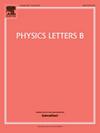Reviving Horndeski after GW170817 by Kaluza-Klein compactifications
IF 4.3
2区 物理与天体物理
Q1 ASTRONOMY & ASTROPHYSICS
引用次数: 0
Abstract
The application of Horndeski theory/Galileons for late time cosmology is heavily constrained by the strict coincidence in the speed of propagation of gravitational and electromagnetic waves. These constraints presuppose that the minimally coupled photon is not modified, not even at the scales where General Relativity (GR) may need modification. We find that the 4D Galileon obtained from a Kaluza-Klein compactification of its higher dimensional version is a natural simultaneous modification of GR and electromagnetism with automatically “luminal” gravitational waves. This property follows without any fine tuning of Galileon potentials for a larger class of theories than previously thought. In particular, the potential is not constrained by the speed test and may also be present. In other words, some Galileon models that have been ruled out since the event GW170817 are, in fact, not necessarily constrained if they arise in 4D from compactifications of their higher dimensional Galileon counterparts. Besides their compelling luminality, the resulting vector Galileons are naturally gauge invariant. We also argue that the Vainshtein screening that allows to recover GR predictions for solar system tests is also at work for electrodynamics in the dense region of laboratory tests.
通过卡鲁扎-克莱因紧凑型结构在 GW170817 之后重振霍恩德斯基
霍恩德斯基理论/伽利略子在晚期宇宙学中的应用受到引力波和电磁波传播速度严格重合的严重制约。这些限制预设了最小耦合光子不会被修改,甚至在广义相对论(GR)可能需要修改的尺度上也不会被修改。我们发现,从高维版本的 Kaluza-Klein 压缩中得到的 4D 伽利略子是对广义相对论和电磁学的自然同步修正,并自动产生 "腔内 "引力波。无需对伽利略势进行任何微调,这一特性就能适用于比以前想象的更多理论。特别是,G4 势并不受速度检验的限制,G5 势也可能存在。换句话说,自GW170817事件以来被排除在外的一些伽利略子模型,如果是在4D中从其高维伽利略子对应物的压缩中产生的,其实并不一定受限。除了令人信服的亮度之外,由此产生的矢量伽利略子自然也是U(1)规不变的。我们还认为,能够恢复太阳系测试的 GR 预测的范斯泰因筛选也在实验室测试的致密区域中对电动力学起作用。
本文章由计算机程序翻译,如有差异,请以英文原文为准。
求助全文
约1分钟内获得全文
求助全文
来源期刊

Physics Letters B
物理-物理:综合
CiteScore
9.10
自引率
6.80%
发文量
647
审稿时长
3 months
期刊介绍:
Physics Letters B ensures the rapid publication of important new results in particle physics, nuclear physics and cosmology. Specialized editors are responsible for contributions in experimental nuclear physics, theoretical nuclear physics, experimental high-energy physics, theoretical high-energy physics, and astrophysics.
 求助内容:
求助内容: 应助结果提醒方式:
应助结果提醒方式:


